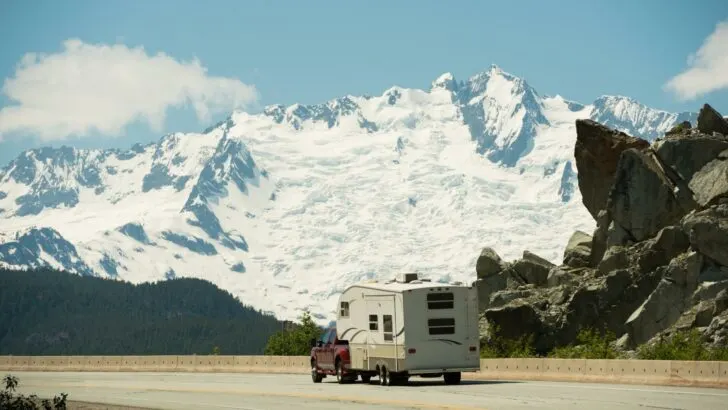As the cool weather approaches, we’re trying to offer some great fall and winter camping information for RVers who enjoy camping in any weather. And the truth is that there are myriad ways to stay warm in your RV while continuing to travel in cold weather. Today’s focus is on the diesel heater.
For many years now we’ve talked about the various methods of heating your RV in winter or at high altitudes that can be chilly in all seasons.
Back in 2015, our post on RV heating pros and cons covered various methods of staying warm in your RV and even offered an RVgeeks video in which we discussed electric space heaters, propane heaters, heat pumps, and more.
But this is the first time we’ve presented a post exclusively on the option of diesel heaters. And as it turns out, it’s a pretty hot great option. ????
So, let’s take a look at what a diesel heater is, the pros and cons of having one, and what to look for if you’re considering installing a diesel heater.
- 1) What Is a Diesel Heater For an RV?
- 2) How Does a Diesel Heater Work?
- 3) What Are the Benefits of a Diesel Heater for an RV?
- 4) What Are the Disadvantages of Diesel Heaters for RVs?
- 5) Things to Consider When Buying a Diesel Heater for an RV
- 6) How Do I Maintain an RV Diesel Heater?
- 7) What Is a Good Diesel Heater for an RV?
What Is a Diesel Heater For an RV?
A diesel air heater burns diesel fuel to heat the air which then moves through a heat exchanger to distribute the warm air throughout your RV.
But, unlike a propane heater which requires a spark to ignite the fuel, a diesel heater uses compression, thus eliminating the need for a spark.
This is significant for a couple of reasons:
- First, it’s more fuel efficient, making it is suitable for longer operating times. This is why many commercial trucks and buses have diesel parking heaters, for example.
- Second, it’s power efficient, since the compression is able to be driven solely by 12V DC power.
So, diesel heats using less energy overall.
How Does a Diesel Heater Work?
A diesel heater has a combustion chamber like all diesel engines do.
Air compresses until the temperature reaches around 550 degrees. Here, the diesel fuel is injected into the combustion chamber where the high heat causes the fuel to ignite.
What Are the Benefits of a Diesel Heater for an RV?
As with anything else, there are pros and cons to using a diesel heater in an RV.
Let’s take a look at the advantages of diesel heaters.

While both work to keep your RV warm in cold weather, diesel air heaters have numerous advantages over propane heaters.
Safer than Propane Heaters
Because diesel heaters don’t require a spark for ignition, they’re safer overall than propane heaters. In the event of a diesel leak, it would be unlikely to ignite a fire outside the compression chamber.
Additional Safety Features
These heaters are quite safe to operate and usually have some safety features including auto shut-off. This shuts down the system if the temperature gets too high or if the heater should fall over.
Produces Less Carbon Monoxide
Diesel heaters release less carbon monoxide than propane heaters do, (though the exhaust from diesel heaters should still be vented to the outside).
Remember that compression is what ignites the diesel fuel. The compression chamber is sealed and exhaust is vented to the outside, so carbon monoxide isn’t introduced into the interior of the RV like would happen with a propane space heater.
Heat Quickly
A diesel heater is fast heating. The air warms quickly.
To circulate the warm air, the heater relies on an internal fan. That fan pulls in air from inside the RV and then circulates it around the heat exchanger. The warm air is then blown into the RV’s living space.
Fuel Efficient
Diesel heaters are said to be 90% fuel-efficient which is excellent.
Less Off-Gassing
There is little off-gassing with a diesel heater so there is little concern regarding indoor use or use in small spaces like RVs.
Use Only 12V (DC) Power
12V diesel heaters use only 12V DC power and don’t require 110V AC power to operate at all.
Convenient for Diesel RVs
If your RV has a diesel engine, the heater can get its fuel from the vehicle’s onboard tank.
However, there is also a heater that uses gasoline. More on that in just a minute!
Diesel Fuel is Readily Accessible
It’s usually easy to find diesel fuel on the road. Propane can be a bit more difficult to locate, depending on where you are when you need a refill.
No Condensation is Produced

Condensation in an RV can create big problems over time. Because a diesel heater vents the combustion/exhaust gases outside, no additional moisture is added to the interior of your RV.
This is a very significant advantage in an RV. Whereas burning propane (with an exposed flame space heater, not your onboard propane furnace which vents combustion byproducts to the outside) contributes significantly to the humidity in the air and thus to condensation in the RV, a diesel heater (whether you’re using diesel fuel or gasoline) does not produce condensation.
This is actually a big deal because one of the big drawbacks of propane (space) heaters is the amount of condensation they produce, and we all know that moisture is an enemy of RVs.
Diesel heaters allow for the air to remain dry. Again, this is true whether you’re burning diesel or gasoline in the heater. It’s not about the fuel – it’s about the heating process.
What Are the Disadvantages of Diesel Heaters for RVs?
There are a couple of disadvantages of diesel heaters to consider.
May Require a Diesel Fuel Tank
If you’re going to use diesel fuel, you’ll need to have a diesel fuel tank available. If your rig has a diesel engine as ours does, then you’ll naturally have that tank available.
But if you have LP appliances and a gasoline engine, you’ll either need a dedicated diesel fuel tank or you’ll need to buy a heater that is capable of burning gasoline.
Expensive to Buy
A diesel heater can be expensive to buy, but its fuel efficiency and other advantages should allow you to recoup that upfront cost over time.
Can Be Noisy
Depending on the unit you purchase and the type of fuel pump it has, a diesel heater can be noisy when running.
To avoid this, you want to select a high-quality heater and be sure to install it (or have it installed) properly.
Be sure to research user reviews regarding the noise factor if this is a concern for you.
Things to Consider When Buying a Diesel Heater for an RV
When shopping for an appropriate diesel heater for your RV, there are a number of things you’ll want to consider.
Size and Weight
Diesel heaters are available in a variety of sizes and weights.
Consider the size of the space you need to heat. Some units are more compact than others.
Fuel Consumption
Although diesel heaters are more fuel-efficient, some are more efficient than others.
Check the fuel consumption rate of the units you’re considering. The less you have to fill your fuel tank, the better, and the more boondocking time you’ll get!
Heat Output
Most heaters produce between 10,000 and 27,000 BTUs.
You’ll want to choose your heater based on its heating capacity relative to the amount of space you’re trying to heat.
Ease of Installation
If you’re looking for a heater you can install on your own, be sure to consider the installation process before purchasing. Some heaters are easier to install than others.
Noise Level

The fuel pumps in some diesel (and gasoline) air heaters can produce a significant amount of noise. Be sure to check the manufacturer’s information as well as user reviews for information related to noise.
Again, we suggest checking user reviews to get a sense from owners of what the actual noise level is when the heater is running.
Some heaters are noisy based on the movement of the fuel pump. Some heaters have a rubberized mounting bracket which cuts down considerably on noise.
Cost vs. Quality
Diesel heaters can cost anywhere from $100 to $2,500 depending on the quality of the heater and the components involved.
German-made diesel heaters tend to use higher quality parts but that quality is reflected in higher prices. That said, they also tend to be far more durable which means that you won’t be replacing your heater frequently as could be the case with a cheap heater.
Beware of inexpensive Chinese heaters. A very low price will generally reflect cheap, low-quality parts. For example, you can pay over $2,000 for a high-quality 2,200-watt German heater, and you can also find a cheap Chinese heater for a few hundred dollars, rated at 5,000 watts.
Be wary of the quality of the low-priced heaters if durability is of interest to you. They’re less likely to last and may even be dangerous. As always, check user reviews carefully.
Remote Control
If you want to be able to control your diesel heater from across the room or from another area of your RV, be sure to look for a heater that offers remote control.
LCD Monitor
If you’d like to be able to mount an LCD monitor on your RV’s wall to keep an eye on your heater’s operation, you’ll want to be sure that the installation kit for the heater you’re buying comes with a mounting plate and an LCD switch.
How Do I Maintain an RV Diesel Heater?
Diesel heater maintenance is important for the proper (and safe) operation of your heater over time.
You’ll want to follow the maintenance instructions in your owner’s manual to keep it running efficiently.
Examples of regular maintenance tasks may be cleaning/replaceing the filter, cleaning/inspecting the burner, checking the fuel lines for leaks, and possibly bleeding the air out of the fuel lines.
Having your heater serviced regularly should take care of any potential issues and keep your heater running well for a long time.
What Is a Good Diesel Heater for an RV?
While there are a number of diesel heaters on the market, we’re going to focus here on a single heater. This heater is from Webasto and can be purchased to burn either diesel fuel or gasoline.
We’ve chosen to highlight this particular heater for a few reasons.
First, Webasto is a German company and its products are made with high-quality components. We figure they’re number one in the world among commercial air heaters for a reason.
Second, they offer units capable of using either diesel fuel or gasoline. This way, even if your RV doesn’t have a diesel engine, you won’t need to install a separate diesel fuel tank. You’ll be able to tap into your existing gasoline supply.
And the third reason we’ve chosen to look at this particular heater is that our friend Brian (RV With Tito) installed one on his RV and created a video about the heater and the installation process.
We’ll post Brian’s excellent installation video (he installed the gasoline version), and we’ll also post links to Webasto’s diesel heater and installation kit as well as its gasoline heater and installation kit.
Brian also posted a video with a report on the Webasto heater after 6 months of use (including how he quieted a noisy fuel pump), and a video with a follow-up at 9 months discussing using the heater at high elevations.
All three videos are full of great information for anyone considering one of these heaters.
Here’s a link to the Webasto gasoline air heater kit that Brian installed:
- Webasto gas heater
- Gasoline bunk heater
And this is a link to the diesel air heater kit by Webasto:
- Webasto diesel heater
For more information on other ways to stay warm in your RV see our tips for winter RV camping and winter RV living, as well as our post on essential winter camping gear.
And with fall comin’ in strong, you might want to glance back at our RV winterizing tips to remind yourself how to get your RV ready for the season that begins with “W”. ????????
Geek Out with Us Every Week
Join our newsletter to learn about all things RV-related. Every week we offer free tips, tricks, product reviews, and more to our online community of RVers. So, whether this is your first time on the road or you’re a seasoned expert, we’d love for you to geek out with us!




Gregory
Friday 9th of December 2022
China made diesel heaters are economical and safe! install was simple in my 1987 Sunraider Toyota RV. Plugged right into my duct system and allowed me to get rid of that unsafe power eating propane monster from the 1980's!!!
why spend $1500.00 when you can get same item for $130.00 and buy new every 3-4 years if you have problem (mine has been trouble free for 5 years)
Same goes for the china made 12v compressor Refrigerators! 1/3 of the price and still working strong after 8 years!
Larry Lee
Sunday 25th of September 2022
We really enjoy cold weather sleeping under our king-size electric blanket with individual controls. So night time is taken care of. Daytime requires adequate clothing.
TheRVgeeks
Tuesday 27th of September 2022
Hi Larry! Sounds like you've landed on a similar solution to ours... we use a heated mattress pad that keeps us snug as bugs in a rug... at night! ????????
Bruce
Sunday 25th of September 2022
We have an Oasis hydronic heating system that uses diesel to heat a fluid that heats a system that produces hot water, heats the coach, and keeps the engines warm when the temperatures drop. I don’t think you were talking about a diesel-based hydronic system in this article, correct?
TheRVgeeks
Tuesday 27th of September 2022
That's correct, Bruce. We covered hydronic heating systems in a separate article you can read here: https://www.thervgeeks.com/rv-hydronic-heating-system/
Gay RV Enthusiast (Jason)
Sunday 25th of September 2022
Hey guys. I hope you're doing well. I agree. Now that it's getting to be Autumn, it's getting cooler. I don't know what it's like in France, but it's cold in some areas of the USA, and we all need some means to keep warm. The question is how to keep warm without either catching fire or getting sick from carbon monoxide. I've slept inside an RV before, and while the bed is comfortable, at night, I'm freezing my ass.